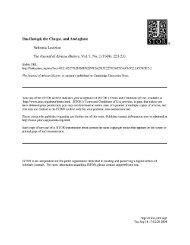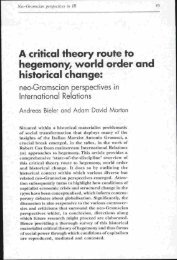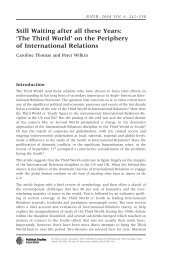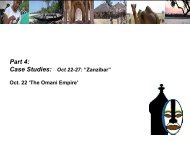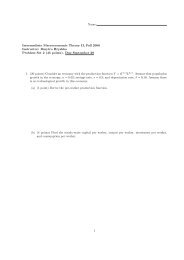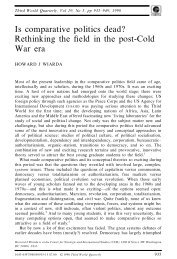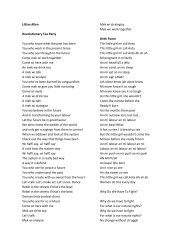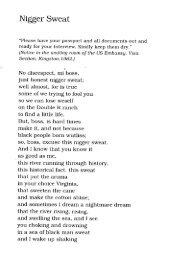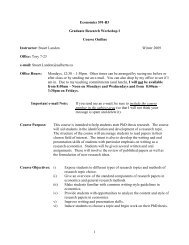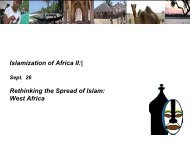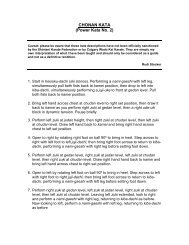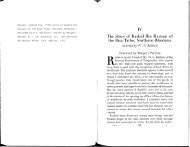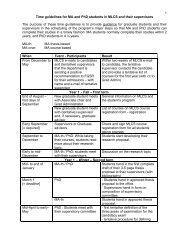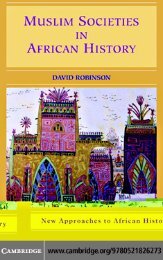personal memories revolutionary states and indian ocean migrations
personal memories revolutionary states and indian ocean migrations
personal memories revolutionary states and indian ocean migrations
You also want an ePaper? Increase the reach of your titles
YUMPU automatically turns print PDFs into web optimized ePapers that Google loves.
students.<br />
Using only hearsay as evidence,<br />
Norton claims in the first chapter of the<br />
book that Strauss was close to Nathan<br />
Leites <strong>and</strong> Albert Wohlstetter (p. 9).<br />
Now it would have been difficult for<br />
Strauss to have much to say to Leites, so<br />
distinct were their manners of<br />
perceiving politics <strong>and</strong> the course of<br />
human action as well as thought.<br />
Moreover, Leites was hardly ever at the<br />
University of Chicago. His imaginative<br />
underst<strong>and</strong>ing of how he might fulfill<br />
his teaching obligations while residing in<br />
Paris never quite found favor in the eyes<br />
of university administrators <strong>and</strong><br />
prompted a mutually agreeable contract<br />
termination only a few years after his<br />
arrival. Indeed, of all those close to<br />
Strauss during Leites’s tenure at<br />
Chicago, I may well have been most in<br />
contact with Leites. He never let on to<br />
me that he had a close relationship with<br />
Strauss. Many others have explained at<br />
length how different Wohlstetter’s<br />
approach to politics was from Strauss’s,<br />
so there is no need to pursue that<br />
theme.<br />
The title of Chapter Two, “The<br />
Lion <strong>and</strong> the Ass,” refers to Robert<br />
Sacks’s commentary on Genesis.<br />
Norton exploits some rather curious<br />
tales about the way various students of<br />
Strauss assisted Sacks during the writing<br />
of this book to insist that they are<br />
foolishly protective of certain writings.<br />
The account reads well, as fiction most<br />
often does. Her portrait of Leon Kass<br />
will persuade no one who has any<br />
acquaintance with Kass, <strong>and</strong> she<br />
completely misconstrues his reluctance<br />
to share with her a writing in progress<br />
that a friend had asked him to critique.<br />
Kass is well-known for his own<br />
thoughtful interpretations of Scripture.<br />
Moreover, from his own connections<br />
with St. John’s College, he knows Sacks<br />
well. So it is only reasonable for Sacks<br />
to have shared the manuscript with<br />
Kass. It is equally reasonable for him to<br />
ask that it not be disseminated widely<br />
until he thought it was ready.<br />
http://web.mit.edu/cis/www/mitejmes/<br />
81<br />
Still, to Norton’s credit, she<br />
does recognize that there was something<br />
powerful about Strauss’s intellectual<br />
appeal (as well as that of several other<br />
professors at the University of Chicago).<br />
But in trying to capture that of Strauss<br />
in particular, she completely misses a<br />
lesson he tried to pass on to students:<br />
always teach as though there is one quiet<br />
student in the class who is more<br />
knowledgeable or more intelligent than<br />
you are – in other words, always be<br />
prepared (see pp. 28-29). To<br />
underst<strong>and</strong> the extent to which Strauss<br />
followed his own advice, one must be<br />
aware of how often Strauss turned down<br />
invitations to dinner the evening before<br />
class on the grounds that he had to<br />
prepare for the next day. Not having<br />
studied with Strauss, Norton is ignorant<br />
of that important fact. Why her<br />
informants seem not to have passed it<br />
along must raise a question or two. No?<br />
Similarly, Norton fails to<br />
explain what drew Leo Strauss to focus<br />
so deeply on good books or even what<br />
such books are all about. For him, there<br />
was no canon revered for itself (pp. 29-<br />
31). That anyone one can readily see by<br />
looking at books Strauss cites in his<br />
various articles. Rather, the point of<br />
reading good books is to try to learn<br />
about the tradition of thought to which<br />
we are heirs <strong>and</strong> to underst<strong>and</strong> how its<br />
unfolding has brought us to our present<br />
opinions. That goal is valid whether one<br />
speaks about our own Western tradition<br />
or about some other tradition. (Here<br />
things become complicated, for the<br />
Eastern tradition has many str<strong>and</strong>s; <strong>and</strong><br />
it is not clear whether we really want to<br />
divorce the Middle Eastern tradition<br />
from the Western one). But without<br />
going into that problem, the salient<br />
point is how Strauss insisted his goal<br />
was to know the past well in order to<br />
reflect intelligently upon the present.<br />
Anne Norton’s account of<br />
Straussian “truth squads” in her third<br />
chapter <strong>and</strong> claim that Strauss sought to<br />
take over the political science<br />
department at the University of Chicago



